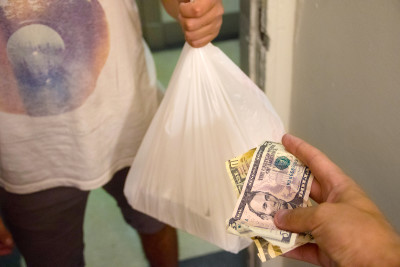
As Google and Amazon expand into the food delivery industry, the question still remains what will become of dedicated food and grocery delivery services like Instacart and GrubHub, sites that operate in Boston and have plans to expand.
Google Express, which began just under two years ago in Northern California, launched in the Midwest on Sept. 8, expanding grocery and food delivery service to over 25 million more people. On the same day, Amazon expanded its restaurant delivery service Prime Now into Seattle.
Gus Lopez, general manager of Amazon Restaurants, described his excitement about Prime Now’s expansion.
“Prime members can now enjoy food from the Seattle restaurants they love without having to drive all over the city,” Lopez said in the release. “For many of these restaurants, this is the first time they are offering delivery, and we are delighted they have chosen to work with us.”
Michelle Faulkner, spokeswoman for grocery delivery service Instacart, said if Google and Amazon were to expand into Boston, it would not be of concern because those companies have “a completely different model” from Instacart.
Instacart recognizes the preferences shoppers have, Faulkner said, especially when selecting produce.
“Grocery shopping can be really personal for some people,” Faulkner said. “Some people like green bananas, some people like lean meat, some people like avocados that will be ripe tomorrow. Instacart shoppers go through a lot of training to choose the produce because you wouldn’t want just anyone picking out your groceries. There’s some finesse and skill that goes along with it.”
Boston continues to be an important location for Instacart, Faulkner said.
“Boston was the third city for us, so we’ve been here for awhile, and our geographic section [here] stretches farther than any city other than San Francisco,” Faulkner said. “We’ve extended far into the suburbs. We’ll definitely continue to expand. Every couple of months we expand and add new zip codes.”
Interestingly enough, Faulkner said, Instacart tends to expand based on cities with higher levels of precipitation, as people are less likely to want to go out for groceries in poor weather.
“Something interesting about Instacart is that we do really well with cities with a lot of precipitation, like Boston,” Faulkner said. “So we look at that when expanding. Our second city was actually Chicago, where there’s a lot of snow, and then after that, our third was Boston, where there is certainly a lot of snow.”
Lindsey Ruthen, a spokeswoman for GrubHub, said Boston is a great place for food delivery services.
“Boston is a great market for us. We currently have more than 1,000 restaurants in the area,” Ruthen wrote in an email. “While it’s easy to assume a majority are hungry college students, we have a wide variety of customers including, but not limited to, business professionals, working parents and people who are looking for new delivery options in their neighborhood.”
Despite the success they have seen in Boston, Ruthen said GrubHub’s biggest competition will likely always be paper takeout menus.
“Our biggest competition remains the menu in the drawer. 95 percent of takeout orders are still placed via paper menu and phone,” Ruthen said.
Several residents expressed how useful food delivery services are for those who might lead busier lives.
Jian Xu, 45, of Brighton, mentioned how helpful food delivery services can be.
“Food delivery services are really helpful if you’re busy, or even if you don’t feel like getting food yourself,” he said. “That’s good if they’re doing well here or wanting to come here.”
Stephen Quin, 46, of Brighton, said the services are beneficial for those who need them.
“I’ve never personally used any of those services, but they sound interesting,” he said. “I guess they work nicely for those who are too busy to go themselves to get food so they serve their purpose.”
Amanda Roche, 33, of Back Bay, said there could be healthy competition if more businesses expanded into Boston.
“I like the idea of food delivery services. They’re a nice alternative to having to go yourself to get food,” she said. “If we had more companies coming into Boston, that would increase competition between them, which could be good for customers.”






















































































































